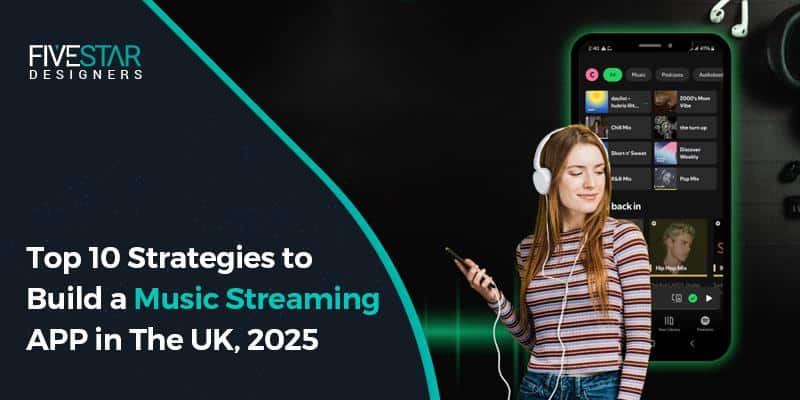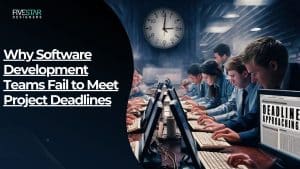Nowadays, how people discover music and listen to it is transforming with the rise of music streaming app development in the UK. Platforms like Spotify, Apple Music, and Deezer are dominating the space, but there’s still room for innovative improvements, especially for startups that understand their audience’s needs and can easily adopt the latest technologies.
Globally, IFPI 2024, the 4.8% refers to growth in revenue. Moreover, according to the BPI, streaming accounted for over 87.7% of the UK’s music market in 2023, generating £1.43 billion in revenue. This trend is expected to continue into 2025.
These statements indicate that the future of music streaming remains highly active, making it an ideal time to develop a music streaming app tailored to UK audiences.
Top 10 Strategies To Build a Music Streaming App in 2025
Strategy No. 01 – Start With a Lean MVP (Minimum Viable Product)
Developing an MVP that features the essentials before launching a full-scale app is a safer approach. Play, pause, search, playlists, and profiles, testing these features with small user groups in the UK might help you validate demands, minimize costs, and ensure your cost to build a music streaming app stays efficient.
Strategy No. 02 – Adopt a Modular and Scalable Architecture
The core elements of your app determine its future growth. Use microservices architecture, REST, or GraphQL APIs, and CDNs like Cloudflare or Akamai for smooth, low-cost streaming across the UK and Europe. The adoption of 5G can scale infrastructure and ensure consistent playback and performance, even with high-traffic peaks.
Strategy No. 03 – Integrate AI for personalised Listening
AI in music streaming is at the heart of modern user engagement, moving beyond simple playlists to create deeply personalized and interactive experiences.
- Use of Machine Learning to analyze user habits and suggest tracks.
- Creating AI-driven mood-based Playlists.
- Applying predictive analytics for real-time recommendations.
This personalization can increase session times and user loyalty, two key KPIs for any successful music app development project.
Strategy No. 04 – Smart Monetization Model
To achieve long-term success, sustain revenue diversity. There are some music app monetization models to be included:
- Freemium plans offer free tiers with ads, as well as a premium option for ad-free music.
- In-app purchases give exclusive tracks, concert tickets, and merchandise.
- Blockchain-based royalties to ensure transparent artist payments.
- Targeted ad partnerships with the UK brands.
These approaches can balance out your profitability with a positive user experience.
Strategy No. 05 – Different Unique Features
Suppose you want to stand out in the UK’s saturated market. In that case, construction is slightly awkward. A stronger phrasing would be: “To stand out in the UK’s saturated market, it’s essential to offer unique features such as social listening so users can share sessions in real-time, and live music concerts, streams, lyrical displays, and podcast integration.
By featuring these suitable British music cultures, from grime to indie, apps can gain authentic relevance and further success.
Strategy No. 06 – Cross-Platform Experience
Building apps with Flutter or React Native can ensure consistent performance across iOS, Android, and desktop devices, as users expect a seamless experience when switching between them. The cherry on top is the addition of offline mode for premium users and device syncing for cars, smartwatches, and smart speakers, which is vital for the UK’s mobile-first audience.
Strategy No. 07 – Focus on Testing and Analytics
Testing the apps before the time can help prevent downtime and mistakes by testing under varied network conditions across the UK, performing A/B Testing for subscription tiers, and monitoring key metrics such as skips, likes, and playlists completions for these tests using tools like Firebase Analytics or Mixpanel to interpret data and improve UX continuously.
Strategy No. 08 – Secure Licensing and Legal Compliance
Music licensing in the UK involves PPL and PRS for Music, and to obtain streaming rights, it is necessary to implement Digital Rights Management (DRM) to prevent data piracy. Additionally, full GDPR compliance is maintained to ensure user data security, which enhances credibility and protects both the platform and the artist.
Strategy No. 09 – Invest in Marketing and Growth
Building the app is half of the journey, but what drives downloads is good marketing.
- Optimization fr the App Store and Google Play UK search.
- Collaborate with British influencers for local music festivals.
- Increase SEO, Social Media, and Email campaigns.
- Offer free trials for referral programs to facilitate rapid user acquisition.
These types of smart promotions can convert an app into a recognized UK digital music brand.
Strategy No. 10 – Prepare for the Future of Music Streaming
Transforming technologies will define the future of music streaming
- Hi-Fi and Spatial Audio are now becoming standards for premium tiers.
- AI-generated playlists enhanced discovery for users.
- AR/VR concerts, enhanced by 5G, offer an immersive experience for users, thereby increasing user engagement.
- Blockchain royalties give artists fair pay and transparency.
Investing in these immersive techs early can ensure your platform remains future-ready through 2025 and beyond.
Industry Trends 2025
- According to BPI, the UK has seen streaming revenues up 12% since 2021, reaching £1.43 billion in 2023.
- Globally paid subscribers have passed 750 million in 2024.
- Adoption of AI in music streaming has grown over 70% since 2021.
These trends highlight the ongoing growth opportunities in the UK music app market, making it essential for developers and investors in Britain to invest in music streaming development now.
Final Thoughts
In 2025, the success of music streaming app development in the UK hinges on creativity, scalability, and the intelligent use of AI. If developers want to dominate the music universe, they must blend data-driven recommendations, unique monetization strategies, and superior design.
5 Star Designers specializes in creating custom music streaming apps built for the UK audience, combining innovation, security, entertainment, and exceptional user experience.
FAQs
How long does it take to develop a music streaming app?
A basic MVP typically takes around 4-6 months to develop, while a feature-rich, AI-driven app can take up to 8-12 months to build and thoroughly test.
Can startups compete with Spotify or Apple Music?
Yes, but by focusing on niche audiences, local content, personalised playlists, and unique user experience.
How much does it cost to build a music streaming app in the UK in 2025?
The average cost range is between £60,000 and £200,000, depending on app complexity, AI integration, licensing, and cross-platform support.



